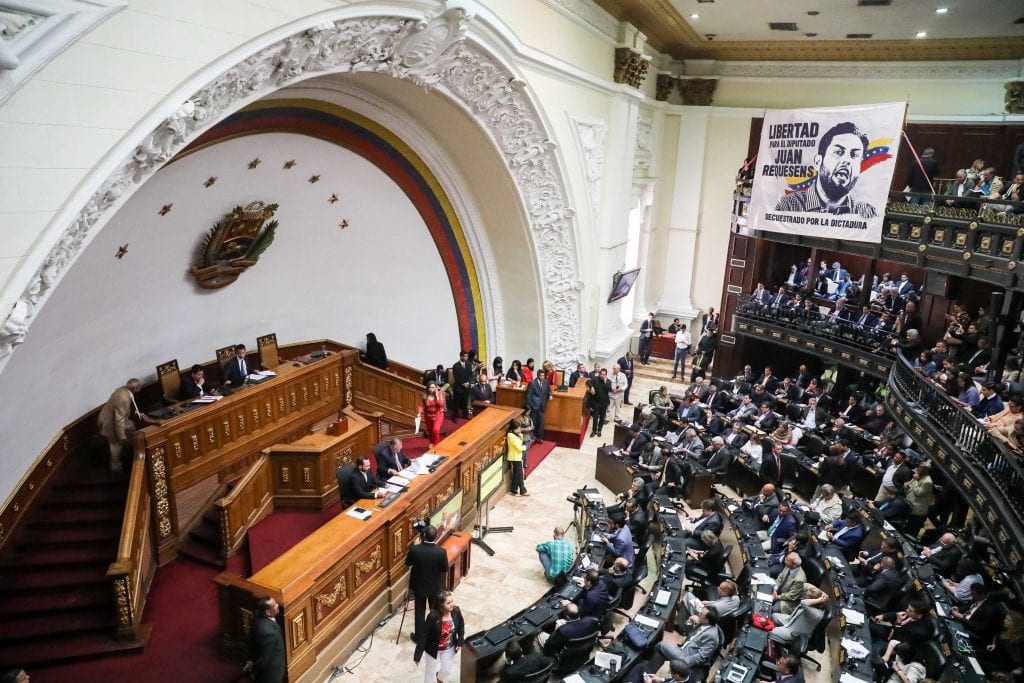
Spanish – The paraphernalia in the January 5 legislative swearing-in passed, and the truth is that it left more questions than answers. On the one hand, Chavismo installed an invalid Assembly, lacking international recognition. On the other hand, the opposition coalition carried out an act to formalize the continuity of its functions and installed a new additional annual period. Both allude to legitimacy based on the vote of the citizenry. Both speak of a power granted by the people.
However, there is no clear picture of the manner of dealing with legislative matters. The fact is that Venezuela is experiencing an institutional crisis. International organizations perceive it as such, and beyond taking a stand, they show caution in their pronouncements.
The communiqué issued by the European Union this Wednesday is an example. While explaining that it considers that the elections “failed to comply with the international standards for a credible process and to mobilize the Venezuelan people to participate,” it also said that it will maintain “its engagement with all political and civil society actors striving to bring back democracy to Venezuela, including in particular Juan Guaidó and other representatives of the outgoing National Assembly elected in 2015.”
Additionally, the struggle of ideologies permeates every step of both parliaments. Currently, at least 50 countries recognize Guaidó. Meanwhile, Chavismo relies on cronyism with the regimes of Iran, Syria, Cuba, Nicaragua, Turkey, Saudi Arabia, China, Bolivia, Trinidad and Tobago, Argentina, and Mexico, just to name a few. All of them use the excuse of recognition based on their doctrines, without stopping to study the vices of both processes.
The analysis of the president of the Supreme Court of Justice in exile
And the fact is that “vice” is the right word to call the tactics that led to what has happened within the now battered legislature. It is a scenario that could already be seen coming and which was opportunely outlined by the president of the Supreme Court of Justice in exile, Miguel Ángel Martín, to the Panam Post: “We are going to find ourselves with a complex international legal scenario because we are going to have deputies elected in a fraudulent process but voted for by the citizens, and we will find ourselves with deputies who did not participate in that process and who in theory should continue with the exercise of their power as deputies to the National Assembly. There will be an interesting numerical war in addition to the institutional breakdown.”
Further, the official also elaborated on some restrictions that, in his opinion, could have been attacked in time: “When they were going to elect President Guaidó (in 2020) we were proposing that a provisional president be appointed until there are free, democratic elections and the National Assembly is maintained with a separation of powers to create the triad of powers that exists in Venezuela. They did not share our opinion, and now we find ourselves with a constitutional issue when the constitutional period of the National Assembly’s deputies expires.”
Likewise, Martín asserted that the Supreme Court of Justice has proposed several aspects to attack the problem that today by default, also deteriorates the image of the country’s institutions before the world’s democracies.
This institutional damage can be reflected in the main objective that both trenches have already manifested: to obtain control of Venezuelan assets abroad. A struggle that increases in the most critical cases, such as the Venezuelan gold -currently in dispute- deposited in the United Kingdom and the control of the Citgo refinery, protected by the United States under the administration of President Donald Trump.
The legislative battle: a fraudulent assembly vs. a “Delegate Commission.”
For now, the legislative struggle is reduced to the directives of the parliaments: Jorge Rodríguez, Iris Varela, and Didalco Bolívar for Chavismo against Juan Guaidó, Juan Pablo Guanipa, and Carlos Berrizbeitia, for the opposition. A fraudulent Assembly of 277 deputies (256 Chavistas plus 21 from a “moderate” opposition) against a “Delegate Commission” during an extraordinary period, whose image of legitimacy rests on an increasingly weak base.
The Delegate Commission is a kind of reduced version of the Parliament, whose functions began in 2015 and, theoretically, would end this January 5. This group will be made up of the board of directors and the presidents of the standing committees, which, according to the constitution, are responsible for maintaining the functioning of the institution during the annual recesses. The Democratic Action Party (AD) holds six positions in the presidencies and vice-presidencies of the different commissions that make up the Delegate Commission. The other positions are distributed among the Popular Will- Guaidó’s party- with four, Justice First with five, and a New Era with six.
The truth is that the damage is already done, and institutions have been the primary victims of this institutional war. Despite all the conjectures that will follow, the recovery of the institutionality looks like an uphill battle. The least encouraging thing about this scenario is that while the political factions argue from their trenches, Venezuela is approaching the debacle at an even faster pace. The humanitarian crisis knows no political colors, but its leaders seem to have forgotten. Unfortunately.
 Versión Español
Versión Español













